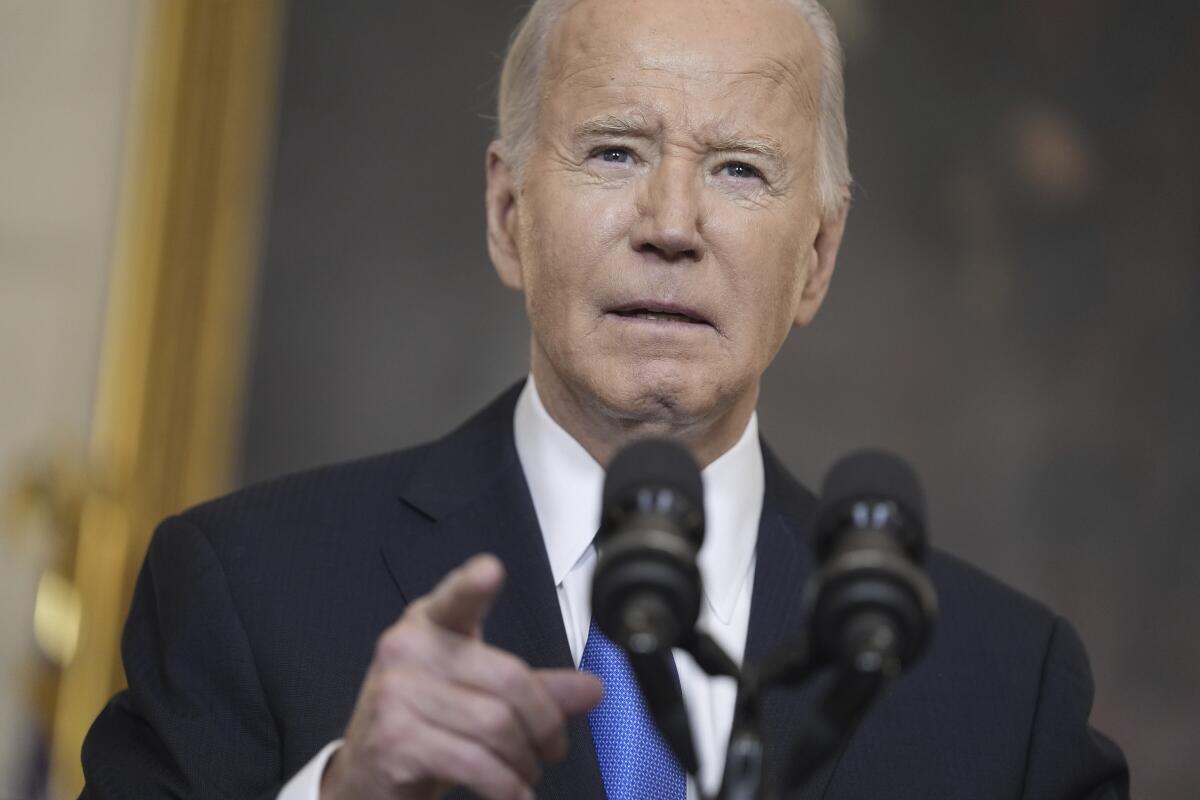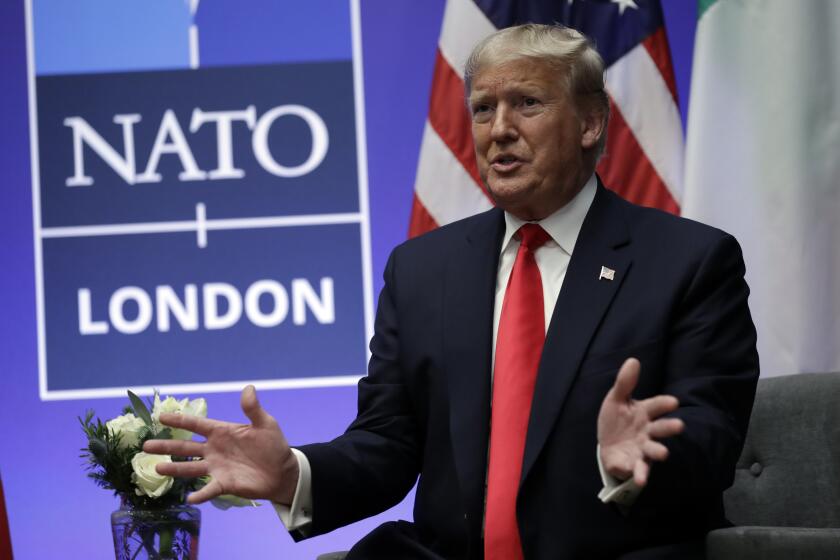Biden says opposing Ukraine aid plays into ‘Putin’s hands,’ calls Trump NATO comments ‘un-American’

WASHINGTON — President Biden on Tuesday called for House Republicans to urgently bring a $95.3-billion aid package for Ukraine, Israel and Taiwan to a vote, warning that refusal to take up the bill, passed by the Senate in the morning, would be “playing into Putin’s hands.”
“Supporting this bill is standing up to Putin,” Biden said, raising his voice in comments from the White House as he referred to Russian President Vladimir Putin. “We can’t walk away now. That’s what Putin is betting on.”
But the package faces a deeply uncertain future in the House, where hard-line Republicans aligned with former President Trump — the front-runner for the GOP presidential nomination, and a critic of support for Ukraine — oppose the legislation. Speaker Mike Johnson (R-La.) cast new doubt on the package and made clear that it could be weeks or months before Congress sends the legislation to Biden’s desk — if at all.
The potential impasse comes at a crucial point in Russia’s nearly 2-year-old war on Ukraine. Supporters warn that abandoning Ukraine could embolden Putin and threaten national security across the globe. Yet the months-long push to approve the $60 billion in aid for Kyiv that is included in the package has exposed growing political divisions in the Republican Party over the role of the United States abroad.
Biden also lashed out at Trump, who said Saturday during a campaign appearance that he once warned a NATO ally he would allow Russia to do whatever it wants to alliance member nations that are “delinquent” in devoting 2% of their gross domestic product to defense.
Trump’s comment about NATO and Russia was the latest instance in which the former president seemed to side with an authoritarian state over U.S. allies.
The president said Trump’s comments calling into question the U.S. commitment to defend its North Atlantic Treaty Organization allies from attack were “dangerous” and “un-American.” Trump’s remarks sowed fresh fears among U.S. partners about Washington’s dependability on the global stage.
“When America gives its word, it means something,” Biden said. “Donald Trump looks at this as if it’s a burden.”
The Senate vote came after a small group of Republicans opposed to the $60 billion for Ukraine held the Senate floor through the night, using the final hours of debate to argue that the U.S. should focus on domestic problems before sending more money overseas. But 22 Republicans voted with nearly all Democrats to pass the package 70 to 29.
“With this bill, the Senate declares that American leadership will not waver, will not falter, will not fail,” said Senate Majority Leader Charles E. Schumer (D-N.Y.), who worked closely with Senate Minority Leader Mitch McConnell (R-Ky.) on the legislation.
The bill’s passage through the Senate with a flourish of GOP support was a welcome sign for Ukraine amid critical shortages on the battlefield.
“Ukrainian soldiers out of artillery shells, Ukrainian units rationing rounds of ammunition to defend themselves, Ukrainian families worried that the next Russian strike will permanently plunge them into darkness, or worse,” Biden said.
The president appealed to House members in stark terms and called on Johnson to let the matter come to a vote. Ukraine supporters were also hoping that the showing of bipartisan support in the Senate would pressure Johnson to advance the bill. McConnell has made the issue his top priority in recent months, and was resolute in the face of considerable resistance from his GOP conference.
Speaking directly to his detractors, the longtime Republican leader said in a statement: “History settles every account. And today, on the value of American leadership and strength, history will record that the Senate did not blink.”
Dollars provided by the legislation would purchase U.S.-made defense equipment, including munitions and air defense systems that authorities say are desperately needed as Russia batters the country. It also includes $8 billion for the government in Kyiv and other assistance.
“Putin’s ambitions have never been limited to Ukraine. His goals are far broader. This means that our defense solidarity must be even broader,” Ukrainian President Volodymyr Zelensky posted on social media.
The legislation would also provide $14 billion for Israel’s war with Hamas, $8 billion for Taiwan and partners in the Indo-Pacific to counter China, and $9.1 billion in humanitarian assistance for the Gaza Strip and the West Bank, Ukraine and other populations caught in conflict zones across the globe.
Progressive lawmakers have objected to sending offensive weaponry to Israel, and Sen. Bernie Sanders (I-Vt.), as well as Democratic Sens. Jeff Merkley of Oregon and Peter Welch of Vermont, voted against it.
“I cannot in good conscience support sending billions of additional taxpayer dollars for Prime Minister [Benjamin] Netanyahu’s military campaign in Gaza,” Welch said. “It’s a campaign that has killed and wounded a shocking number of civilians. It’s created a massive humanitarian crisis.”
The bill’s passage followed almost five months of tortuous negotiations over an expansive bill that would have paired the foreign aid with an overhaul of border and asylum policies. Republicans demanded the trade-off, saying the surge of migration into the United States had to be addressed alongside the security of allies.
But a bipartisan deal on border security fell apart just days after its unveiling, a head-spinning development that left negotiators deeply frustrated. Republicans declared the bill insufficient and blocked it on the Senate floor.
After the deal collapsed, the two Senate leaders abandoned the border provisions and pushed forward with passing the foreign aid package alone — as Democrats had originally intended.
Though the slimmed-down foreign aid bill eventually won a healthy showing of GOP support, several Republicans who had previously expressed support for Ukraine voted against it. The episode further exposed divisions in the party, made more public as Trump dug in and several senators openly called for McConnell to step down.
Sen. J.D. Vance, an Ohio Republican, argued that the U.S. should step back from the conflict and help broker an end to it with Putin. He questioned the wisdom of continuing to fuel Ukraine’s defense when Putin appears committed to fighting for years.
“I think it deals with the reality that we’re living in, which is they’re a more powerful country, and it’s their region of the world,” he said.
Vance, along with Sen. Rand Paul (R-Ky.) and other opponents, spent several hours on the floor railing against the aid and complaining about Senate process. They stalled to delay a final vote, speaking on the floor until daybreak.
Supporters of the aid responded by warning that bowing to Russia would be a historic mistake with devastating consequences. They noted that if Putin were to attack a NATO member in Europe, the U.S. would be bound by treaty to become directly involved in the conflict — the commitment that Trump has called into question.
In the House, many Republicans have opposed the aid and are unlikely to cross Trump, but some key GOP lawmakers have signaled they will push to get it passed.
House Intelligence Committee Chairman Michael R. Turner (R-Ohio) traveled to Ukraine last week with a bipartisan delegation and met with Zelensky. Turner posted on X after the trip that “I reiterated America’s commitment to support Ukraine in its fight against Russia.”
But Johnson is in a tough position. A majority of his conference opposes the aid, and he is trying to lead the narrowest of majorities and avoid the fate of his predecessor, former Speaker Kevin McCarthy (R-Bakersfield), who was ousted in October.
Johnson said in a statement Monday that because the foreign aid package lacks border security provisions, it is “silent on the most pressing issue facing our country.” It was the latest — and potentially most consequential — sign of opposition to the Ukraine aid from House GOP leadership, who had rejected the bipartisan border compromise as a nonstarter, contributing to its rapid demise.
House Democratic leaders are looking at rarely used procedures to force a vote on the bill, but those represent a long-shot effort without Johnson’s support.
More to Read
Get the L.A. Times Politics newsletter
Deeply reported insights into legislation, politics and policy from Sacramento, Washington and beyond. In your inbox three times per week.
You may occasionally receive promotional content from the Los Angeles Times.











